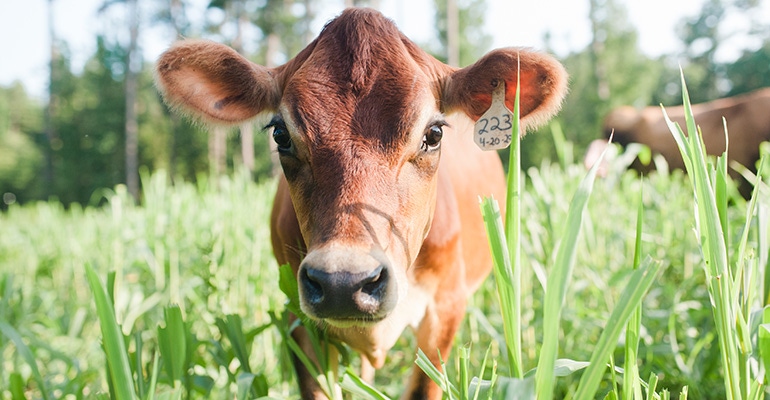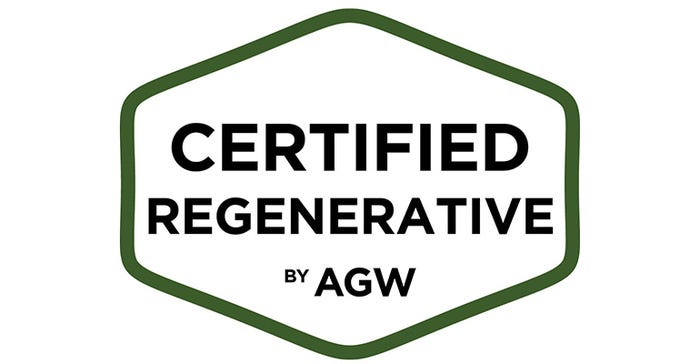With its new certification process, AGW provides expert advice and auditors to help farmers achieve certification for their regenerative agriculture work.

After five years of planning and preparation, A Greener World (AGW) in August launched its Certified Regenerative by AGW program to help farmers achieve soil health and ecological biodiversity.
"The biggest distinction of our program is it functions like a management tool," says Emily Moose, executive director of agricultural nonprofit certifier A Greener World. "It looks at the farm from a holistic perspective, as an ecosystem, and how it can be as regenerative as possible. Every farm is different. Every soil is different."
Other major regenerative agriculture validations revolve around different standards. Regenerative Organic Certification, for example, requires that farms are certified organic by the USDA before engaging in the process that leads to the ROC seal. Land To Market focuses almost entirely on soil health without imposing many requirements on farms. Farmers must demonstrate measurable progress toward achieving increasingly healthier soil to have a good shot at receiving Land To Market verification.

Gaining AGW Regenerative certification requires farmers to draft five-year plans addressing a wide range of factors, such as human health, air and water quality, biodiversity and soil vibrancy. The plans must include benchmarks and metrics to evaluate every aspect of the farm. Panels of qualified experts then scrutinize the plans. Eventually, AGW and farmers agree on a plan and AGW sends auditors to make sure the plan aligns with the actual land and ecosystem.
Farmers who demonstrate progress toward fulfilling their benchmarks can receive AGW certification in the first year. The five-year goal is to yield agriculture that complements and improves the surrounding environment.
A handful of farms signed up for an 18-month pilot program that informed the overall certification. A farm in the United Kingdom was the first to receive the seal, and more are on the way. Given intense interest in participating in the program, Moose anticipates the seal will become widespread as more farmers enroll and begin charting their five-year courses.
"We use the term steward, and emphasize stewardship in farming," Moose says. "Farmers just show progress toward implementing the comprehensive, holistic plan, and in meaningful ways. It's not about just planting another wildflower meadow."
Interest in regenerative agriculture has risen dramatically during the past five years. Google searches for the term started escalating dramatically in the spring of 2019. Searches peaked in April but remain high. In the United States, Coloradans search for regenerative agriculture more than the residents of any other state.
Regenerative agriculture practices have also generated controversy. Protesters in early September swarmed the Regenerative Agriculture and Food Systems Summit in the Netherlands, accusing the movement of greenwashing and fraud. Global companies such as Nestle, fertilizer manufacturer Yara and global agribusiness corporation Syngenta were among the conference sponsors.
Protestor released a statement criticizing the corporations, saying, "These companies pretend to lead the transition to a more resilient and equitable food system, but they are primarily at the root of our interconnected social, climate, environmental and health crisis."
Greenwashing concerns AGW, Moose says. Different approaches to farming clearly can regenerate soil and improve the environment. But without standards and stout third-party certifications, it's easy for corporations to embrace the term and run with it, even if their farming practices do little to heal and advance ecosystems. Given the vital importance of soil and environmental regeneration, AGW decided to craft its own unique, third-party certified program to ensure farmers' deeds mirror their words.
"The level of interest is high, and it does make me hopeful about the potential for positive impact through food and farming," she says. "We wanted to provide a certification that addressed the farm as a whole, and from a systemic level. This certification helps address all of the impacts that agriculture can have on the planet and makes those impacts positive."
About the Author(s)
You May Also Like




